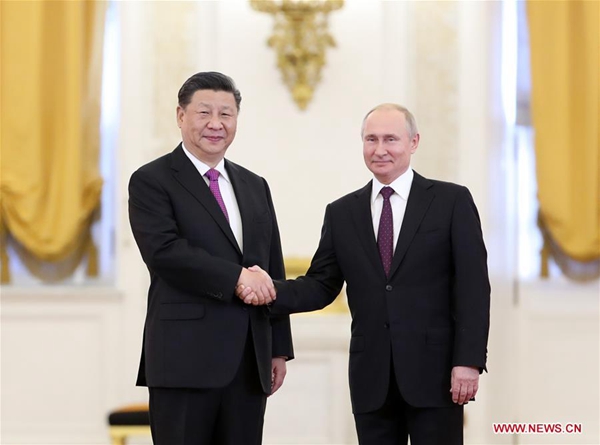China-Russia presidential meetings bolster economic cooperation
The close exchanges between the Chinese and Russian presidents are a powerful force bolstering bilateral economic and trade cooperation, a Chinese economist said on Wednesday.
The close exchanges between the Chinese and Russian presidents are a powerful force bolstering bilateral economic and trade cooperation, said He Zhenwei, secretary general of the China Overseas Development Association.

The trade volume between China and Russia exceeded US$100 billion by mid-December last year, a record high in history.
In an exclusive interview with China.org.cn, He said the historic success is attributable to the frequent meetings of the two heads of state in recent years.
Since 2013, Chinese President Xi Jinping and his Russian counterpart, Vladimir Putin, have met approximately 30 times, significantly improving mutual trust between the two countries and laying a solid political foundation for bilateral economic and trade cooperation, He said.
He, who is in St. Petersburg, said Xi's state visit to Russia from June 5 to 7, is widely anticipated by both nations. "Encouraged by President Xi's attendance, an unprecedented number of more than 1,000 Chinese business representatives will participate in the 23rd St. Petersburg International Economic Forum."
In 2015, the two heads of state signed a Joint Declaration on Cooperation in Aligning the Building of the Silk Road Economic Belt and the Eurasian Economic Union. He said the increasingly close strategic alignment had injected new impetus to China-Russia economic ties.
He explained that the bilateral economic and trade cooperation had been carried out mainly among large-scale state-owned enterprises in energy, while in recent years we have seen much more cooperation among small and medium-sized enterprises across broader fields, including aerospace, electronics, and e-commerce.
The cooperation is also becoming more vibrant at local levels, such as the stronger ties between China's northeast, Russia's Far East, and the Baikal region, as well as along the Yangtze and Volga rivers, he added.
He, who once worked for the economic office at the Chinese embassy in Russia, said the China-U.S. trade friction and the tightening U.S. sanctions against Russia may present new opportunities for China-Russia cooperation.
"For example, China has an annual soybean import demand of around 90 million tons, and one-third comes from the U.S. The trade friction may affect U.S. export of soybeans to China, thus possibly leaving a large market for Russia soybeans," He said.
This year marks the 70th anniversary of the founding of the People's Republic of China and the establishment of diplomatic relations between China and Russia.
He said Xi's visit at a crucial historical juncture is expected to elevate bilateral ties, a paradigm for major-country relations, to a new level.
During his visit, Xi will hold a series of activities with President Putin, jointly attend events such as a gathering celebrating the 70th anniversary of the ties, and sign or witness the signing of some important cooperation documents, according to Chinese Vice Foreign Minister Zhang Hanhui.

